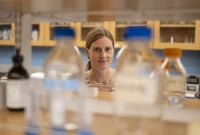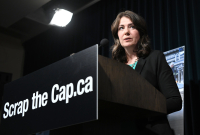Filing into a Toronto office tower's rooftop atrium among other delegates, the Clean50 Summit started like many conferences. Morning networking over coffee and continental breakfasts. The ritual exchange of business cards. Handshakes and many convivial hugs.
But that is where the similarity ended.
The event, now in its fourteenth year, is "doing things more than a little differently," executive director Gavin Pitchford said in his opening remarks, directing the nearly 150 entrepreneurs, investors, community leaders, policymakers and executives to check the back of their name-badges, where a series of animal icons were printed.
Instead of a standard programme of Powerpoint presentations, panel sessions and fireside chats, the summit is built around a day of open-table discussions and idea-generation on green transition topics that ran the gamut from clean finance to sustainable construction, renewable energy to climate action education.
“Canada must reduce 730 megatonnes of carbon pollution annually to meet its Paris commitments and the 2025 Clean50 have made significant strides toward that goal with more to come,” said Pitchford, adding that individuals like those at the summit would be vital in meeting those promises.
“If we’re to meet our commitments, we will owe it to people like those here,” he added. “Not one person here shares another's unique experience and perspective — they have their own,” he said. “Your job today is to both learn and teach."

The spirit of the new — business, ideas and people — flowed through the day's discussions. Delegates from disparate career backgrounds were each ‘guided’ by their name-badge animal icons to different tables throughout the summit, engaging in constructive and far-ranging debates facilitated by experienced convenors who connected the dots between emerging themes and various lines of reasoning.
The same week as the Clean50 summit, the International Energy Agency issued its latest red flag warning that “despite the growing momentum behind clean energy transitions, the world is still a long way from a trajectory aligned with its net zero goals.”
So it was perhaps unsurprising that many of the most invigorating ideas and innovative technologies came from Millennial and GenZ delegates, who have arguably the most at stake in the climate crisis.
“The ingenuity of these individuals is extraordinary,” said Pitchford.

The list of honorees included a quantum chemist working with AI on mass water purification systems, next-generation energy storage technologists, pioneers in zero-carbon public transport, urban sustainable foresters and green hydrogen researchers.
Mihskakwan James Harper, a clean energy innovator from the Sturgeon Lake Cree Nation, took home an energy industry award for spearheading federal financing for Ontario’s Oneida project, Canada's biggest battery energy storage development.
“This project, which is only one of Mihskakwan’s many impactful works, is a key example of meaningful Indigenous partnerships, ensuring multi-generational value returned to the community and offering a pathway towards both net zero and economic reconciliation,” the Clean50 judges said.
Speaking to Canada’s National Observer, Mihskakwan said he hoped Oneida would be a model for future energy storage projects and the acceleration of the energy transition in Canada.
"We want to be an inspiration to other provinces and other First Nations — to show them things can be done in a new way that benefits everyone,” he said. “Like with Oneida and other projects we've done, we want to show people that you must not be afraid to step in and be ‘first.’"

Beyond the emerging leaders, the Clean50 awards recognized 75 individuals and 25 organizations from across Canada for their climate actions, including sustainability executives, venture capitalists and three MPs from the Liberals, NDP and Bloc Quebecois recognized as a single team. Conspicuously absent were any members of the Conservative Party.
Also missing were representatives from Canada’s Big Five banks. An exclusion that would remain, Pitchford said, “until they stop greenwashing and genuinely decarbonize their investment and lending portfolios.”

The Clean50 mission aims to foster partnerships that lead to new climate action projects, said Pitchford, noting a survey of delegates to last year’s summit identified some 400 such “collaborations.”
“When we ask people to solve problems together, they see how other people at the table think. How they communicate. The things they’re working on,” he said.
Mihskakwan said partnerships had been central to developing the Oneida battery project, which he described as a “first-of-a-kind on many levels.”
“Beyond this project we hope to continue the momentum for energy storage and the wider energy transition across the country," he said.







Comments
“The same week as the Clean50 summit, the International Energy Agency issued its latest red flag warning that “despite the growing momentum behind clean energy transitions, the world is still a long way from a trajectory aligned with its net zero goals.””
Not that anyone should care, but an approach I often utilize to thinking critically, and deciding whether I think that thumbs up or down are warranted is to observe how something is stated. Not to mention how many invented opportunities for self-congratulations are evident.
Global GHG emissions continue increasing apace, reaching new record outputs each year, despite of all the renewables development to date.
https://www.google.com/search?q=are+global+greenhouse+gas+emissions+bei…
In spite of this reality, the quote above reflects the “glass half full” AKA “Aside from that, Mrs. Lincoln, how was the play?”, cheery outlook.
I applaud engagement of, specifically, First Nations, whether self-initiated or in partnership. What appears to be missing from this report, however, is any reference to getting by with less (of anything). In this context, the commodity is energy.
A case in point, which highlights “civilized” humanity’s “one step forward, two steps back” track record, is the growing demand for electricity to power an ever-increasing number of microprocessors. Whether for data centres that feed our new-found narcissistic tendencies reflected in social media (or the comments section of news sites), or to energize ridiculously power-hungry, counter-productive activities such as AI and crypto. Where is the opportunity cost analysis for those?
Consequently, to get my thumbs up, I’m looking for work that results in meaningful change in human behaviour, that steers us away from the “success means ceaselessly increasing” basis on which “advanced” societies are based.
I’m not seeing it here.
No leadership, few regulations and Conservative Leaders actively denying climate change by pretending tech will save us. Poilievre, Smith, Moe, Ford, former Premier Higgs ,potential Premier Rustad. No wonder our youth are depressed. My. Newsletters have so many stories of floods, fires, droughts, intense storms ,atmospheric rivers and the largest man-made lake reservoir in the world in Africa is dry, no electricity. Add sea level rise, glaciers disappearing before our eyes. Blind and ignorant leadership
No leadership, few regulations and Conservative Leaders actively denying climate change by pretending tech will save us. Poilievre, Smith, Moe, Ford, former Premier Higgs ,potential Premier Rustad. No wonder our youth are depressed. My. Newsletters have so many stories of floods, fires, droughts, intense storms ,atmospheric rivers and the largest man-made lake reservoir in the world in Africa is dry, no electricity. Add sea level rise, glaciers disappearing before our eyes. Blind and ignorant leadership